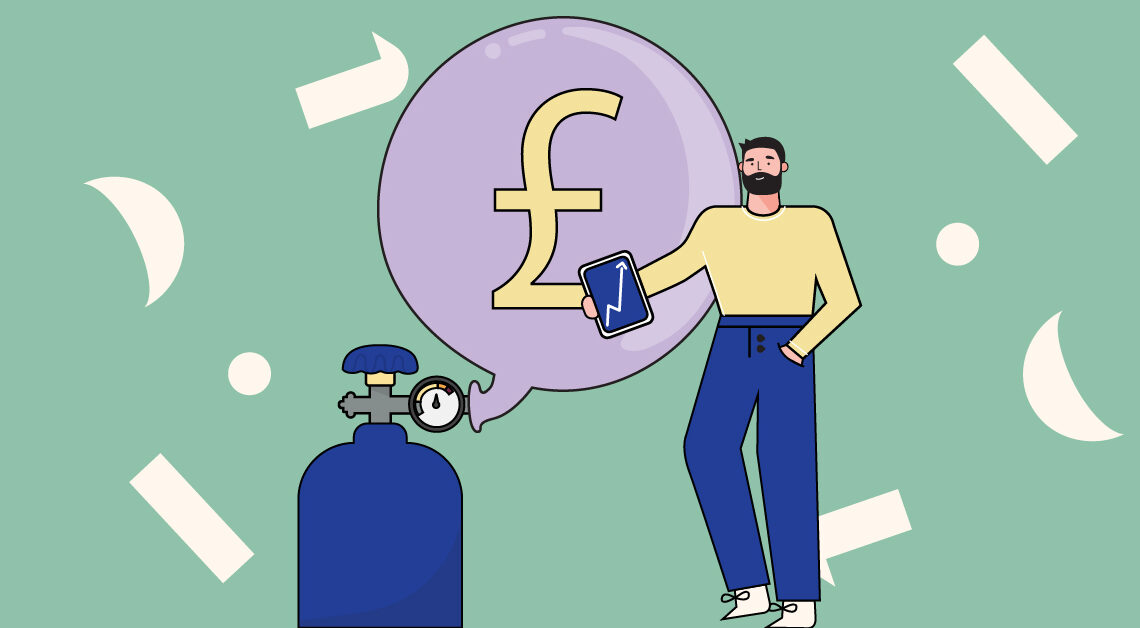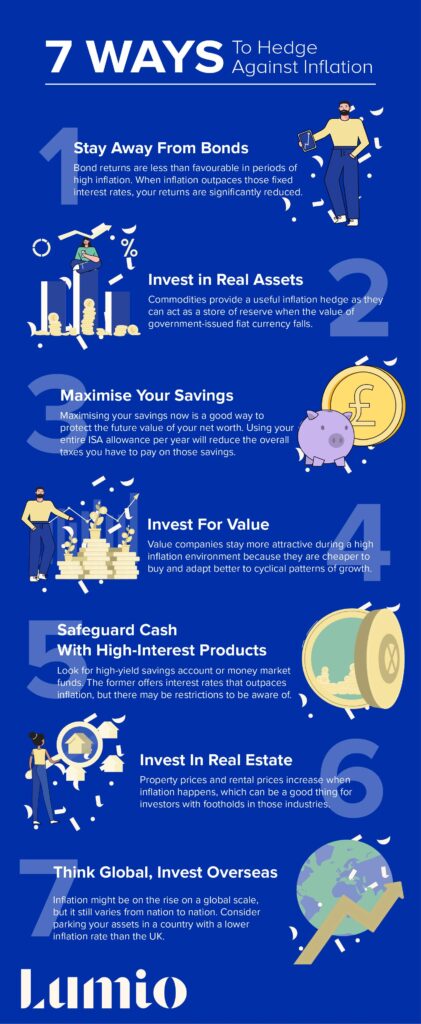
Inflation. Just the word of it can send chills down even the most steadfast investor’s spine. Inflation is to investors what Jason is to unscrupulous teenagers: a threat that is always lurking just out of sight, ready to pounce at any moment.
Investors make a big fuss out of inflation, and for good reason. It can tank the value of investment returns, reduce current purchasing power, and kneecap future returns you might make.
So, it’s in your best interest to hedge yourself against inflation as much as possible. Here are 7 effective ways you can do just that.

7 Effective Ways to Hedge Against Inflation
1. Stay Away From Bonds
In general, bonds are a bad idea for hedging against inflation. Why? Because bonds typically pay a low fixed interest rate payment that is defined by the interest rates of the bond. When inflation outpaces interest rates or gets close, it can reduce the future value of any gains from bonds. That means each payment from bonds will be worth less and less over time.
Some types of bonds are indexed to inflation to prevent this depreciation from occurring. For example, the UK-inflation-linked market features bonds that are indexed to inflation, so their returns keep pace with the devaluation of the pound to compensate. However, these bonds tend to be more expensive than regular bonds.
So, in times of high inflation, lessening your exposure to bonds and relying more on high-return assets like stocks and shares is generally a good idea. Some bonds can remain viable during high periods of inflation though.
2. Invest in Real Assets
“Real Assets” include tangible things like gold, agricultural products, crude oil, and other commodities. Commodities provide a useful inflation hedge as they can act as a store of reserve when the value of government-issued fiat currency falls. The basic idea is that, since people always need real assets, they are less resistant to decline in value. For example, even in times of economic uncertainty, people won’t stop buying food.
Assets such as renewable energy, infrastructure, properties, precious metals and other “hard” investments can both provide a stable income stream that is linked with inflation and resist depreciating effects from inflation. Typically, real assets incur a greater investment cost than financial securities like shares but they can help guard your overall portfolio against the effects of inflation.
So, when the pound is faltering, it might be a good idea to put your money into some real assets. Alternative assets that are tied to real assets are also a good inflation hedge.
- Check out our eToro vs Trading212 review to get the lowdown on 2 of the best (and most user-friendly) online platforms for investing in commodities and other real assets.
3. Maximise Your Savings
Inflation can wreak havoc on your savings, especially if you are only saving a small portion of your income every month. So, if you are not saving as much as you can, you are ultimately shooting yourself in the foot, especially when you factor in any future taxes you will have to pay on ISA earnings.
So, maximising your savings now is a good way to protect the future value of your net worth. Using your entire ISA allowance per year will reduce the overall taxes you have to pay on those savings.
Additionally, with a lifetime ISA, all contributions are matched 25% by the government up to a set limit every year. So if you put in £4,000 then the government will give an extra £1,000 for a total of £5,000.
Taking full advantage of these allowances will reduce the chances of your retirement assets being eaten away by inflation.
4. Invest for Value
When it comes to equities, inflation is neither a good or a bad thing. Most experts agree that an inflation rate of around 2%-4% is a good range for equities and historically has been coupled with good equity growth.
However, when inflation is high, growth stocks can falter.
In times where inflation is low, growth stocks like tech and pharma companies tend to do extremely well because the opportunity cost for expansion and growth is relatively low as production costs are low. When inflation is high though, the main appeal of growth stocks is threatened.
So, one method of inflation hedging is to invest for value. Value companies produce high earnings relative to their investment costs. These kinds of investments can stay more attractive during a high inflation environment because they are cheaper to buy and adapt better to cyclical patterns of growth. A single bad year can tank growth stocks, in contrast.
5. Safeguard Cash with High Interest Products
There are no two ways about it: inflation is bad for cash. Any cash assets you have will not do well in a high inflation environment and cash itself does the worst. It is always a good idea to have some liquid cash on hand for emergencies, so you shouldn’t get rid of any cash you have. But inflation can put pressure on your cash.
Two potential solutions here are a high-yield savings account or money market funds.
The former can offer an interest rate that outpaces inflation, but there might be some restrictions on when you can use that cash and how you can access it.
Money market funds are a good middle ground that puts your cash in liquid assets like cash and high-credit bonds. Money market accounts are riskier than having cash but they are relatively low risk compared to other kinds of investments and income payments.
6. Invest in Real Estate
Real estate investment trusts (REITs) are funds that are composed of several real estate investments. Property prices and rental prices increase when inflation happens, which can be a good thing for investors with footholds in those industries.
REITs also tend to pay out a high dividend yield, though the high rate might not be sustainable depending on the demand for other high-value assets.
As interest rates rise and other assets like gifts and high-yield bonds become more popular, the value of REIT investments can drop.
One other downside of REITs is property taxes. Depending on the type of real estate you invest in, property taxes can take up to 20% of operating expenses for the fund. Also, REITs can be very volatile if property prices suddenly fall.
- Check out our post on real estate investing in your 20s for some solid tips on investing in real estate.
7. Think Global, Invest Overseas
Given that the global GDP is always rising, you can’t escape inflation on a global scale. However, you can park your assets in a country that may have a lower inflation rate than the UK.
Many other economies in the world do not rise and fall in tandem with the UK, such as the US, Italy, Korea, Australia, Japan, and more. Foreign government bonds, in particular, can provide a good source of income that won’t be affected by domestic inflation.
FAQ: What is Inflation & How Does It Affect Purchasing Power?
Newscasters and financial blogs talk about inflation a lot. But what exactly is it?
In simple form, inflation refers to the tendency for the cost of goods and services to rise over time. As the price of goods and services rises, the purchasing power of each individual pound gets lower. Thus, over time, inflation can reduce the purchasing power of the currency.
Inflation represents a loss in the real value of some currency due to rising prices. Inflation is contrasted with deflation, which is a reduction in prices and a subsequent gain in the real value of a currency.
Inflation is caused by many things. On the one hand, inflation is a normal part of any growing economy. As economic productivity gets higher and economies can produce more, demand for goods and services rises. So, it makes sense you would see general rising prices as economies become more active. Most economists agree that some amount of inflation is a good thing for a growing economy.
Very high levels of rising inflation can be bad for the economy and investments though, When inflation is very high, people spend less money because the cost of goods is so high. When they are spending less money, there is less economic activity and thus less stock market and investment activity. Inflation is measured by the consumer price index. The consumer price index records the average price for a bundle of goods.
Sustained inflation can also reduce the value of your savings over time as it reduces its total buying power. This phenomenon is most notable with cash. That £10,000 you have stashed in your mattress will not be worth as much 10 years later because of inflation. The same thing can happen to investments, though to a lesser degree.
Final Thoughts
Inflation can be a bad thing for your investments, but with a bit of smart thinking, you can protect your portfolio from any depreciation.
The key thing to keep in mind is to avoid static assets that do not produce value, as those are the ones that get hurt the most by inflation. Otherwise, keeping investments in high-return liquid holdings can protect any future value from the corrosive effects of hyperinflation and serve as an inflation hedge.
- The 9 Best UK Money Management Apps (2025) – for individuals and couples - August 8, 2024
- What Salary Should You Be Making At Your Age? (UK Guide) - August 8, 2024
- The Top 10 Most Ethical Banks in the UK: A Comprehensive Review for 2025 - August 8, 2024
